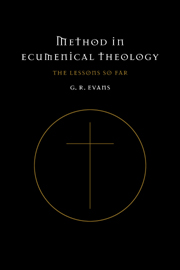Book contents
- Frontmatter
- Contents
- Dedication
- Preface
- Abbreviations
- Introduction: the ‘winter of ecumenism’?
- I What is ecumenical theology?
- 2 Changing attitudes and stages in ecumenism
- 3 Communication and dialogue
- 4 Ecumenical language
- 5 Historical method
- 6 The process in close-up
- 7 Ecumenical reception
- Conclusion
- Index
2 - Changing attitudes and stages in ecumenism
Published online by Cambridge University Press: 02 September 2009
- Frontmatter
- Contents
- Dedication
- Preface
- Abbreviations
- Introduction: the ‘winter of ecumenism’?
- I What is ecumenical theology?
- 2 Changing attitudes and stages in ecumenism
- 3 Communication and dialogue
- 4 Ecumenical language
- 5 Historical method
- 6 The process in close-up
- 7 Ecumenical reception
- Conclusion
- Index
Summary
OTHERS AND OURSELVES
‘The thing that separates us most radically from our … brethren is their attitude of mind and ours.’ Ecumenism cannot begin until there can be a shifting of the stances which have made Christians adversaries, and joined them in warfare instead of love. This has to take place both at a personal and at an ecclesial level. The two are intimately interconnected as we shall see in the next chapter. For our purposes in this one, the important thing is to stress the way the divided come to see others as ‘Christians like themselves’. ‘Ecumenism is basically personal relationships … the unity of the Church i s … speeded by wider and deeper personal understanding.’ Cardinal Mercier had already thought of the possibility of Anglican–Roman Catholic talks before receiving the Lambeth Appeal and before Portal or Halifax had approached him with the suggestion which led to the Malines Conversations. In 1919 he went to the USA where he discovered a sense of brotherhood with other Christians, and un vif désir d'unité, and that transformed his view and his priorities.
It is of the first importance to the dynamics that communities seem somehow collectively to feel a rivalry which echoes the personal adversariality and interacts with it in complex ways. Inter-Christian rivalry and competition tempts to proselytising, for example, with implications we shall come to in a moment.
- Type
- Chapter
- Information
- Method in Ecumenical TheologyThe Lessons So Far, pp. 40 - 65Publisher: Cambridge University PressPrint publication year: 1996



